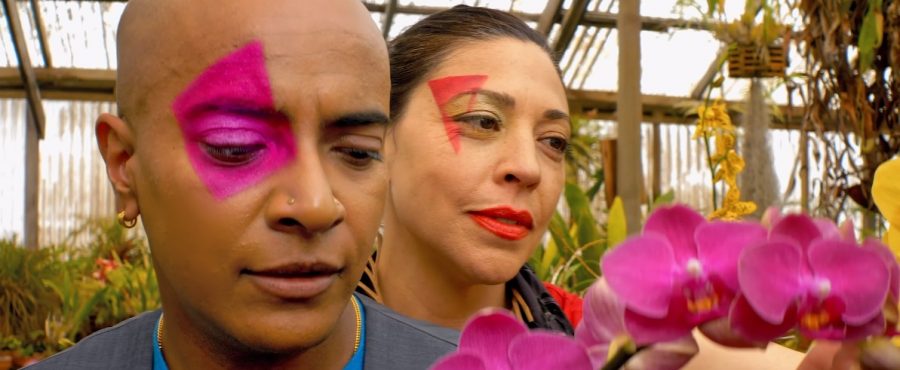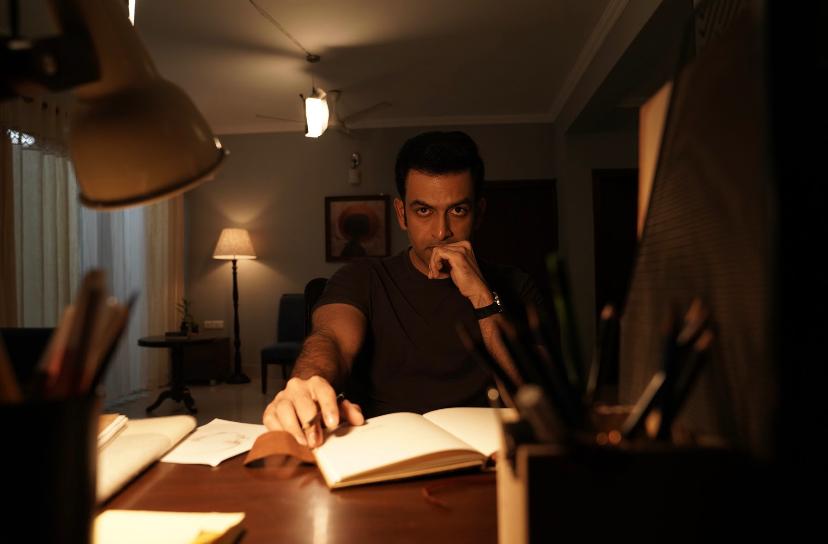Neelu Bhuman’s 2019 film Transfinite doesn’t fix its characters firmly in relation to gender. In the discussion that followed its screening at the Kochi Muziris Biennale yesterday, there was no reference to Women’s Day, even as many of the stories on and off screen were about power, femininity and the politics of all that
Once, in a far away land many planets away, people made images and stories about themselves and shared it with others so they could understand and perhaps grow empathetic stalks towards each other.
And that land is far far away.
What we have instead is the general tendency to not just exclude, discriminate, harass, but also to follow that up with a fawning puppy-dog curiosity of what we ourselves have othered. In that context of usurping, appropriating and general morally righteous standing-about, Transfinite is a special film because it is made by trans people – and it is occasionally beautiful, surprising, sometimes tacky. The film is a sci-fi and fantastical feature film made up of seven short stories coming together. This is Neelu Bhuman’s fourth film, and the first feature-length film made with the support of the trans* people of colour community in California and in collaboration with several writers and artists. Each film follows the story of one or several trans* people. Some of these stories are about finding love, about the families and relationships they have, about sex and desire, and the last short film is nakedly about politics and almost a manifesto. These rather different short films are strung together by drawings and animations.
The triumph of the film lies in the conversations and thoughts it provokes, because admittedly, it has that NRI flavour and is too close to a north American discourse on trans* rights and issues. For the artistic preview organised as part of the Kochi-Muziris Biennale, the filmmaker thought that it would be good to have a panel discussion to contextualise the film in terms of local issues and for the audience in Fort Kochi. This panel of trans* artists and activists had speakers who have links to the filmmaking industry in India. Sheetal Shyam is an actress, model and dancer who has acted in fiction films and also participated in documentary films. Satya Nagpaul is an award winning director of photography, person of trans masculine experience, gender activist, and a homemaker. The panel also included Daya Gayatri, a model, writer, theatre artist, and Gee Semmalar, trans activist, artist and educator, who also recently did a performance at the Biennale.

The panel, that switched between Malayalam and English, began with Daya, Gee, Satya and Sheetal reflecting on the theme of the Biennale this year which was about the possibilities of having a non-alienated life, and what that specifically means for journeys as specific and different as theirs. Sheetal said it was difficult for all marginalised and trans people to live with dignity and pride in Kerala. She particularly spoke about how her femininity is constantly questioned. But also mentioned that when she first went to Bangalore from Kerala there were perhaps 30 lesbians or queer people she met, but now there are at least 100 or more that she knows of. Daya, who is still a student, was alternately defiant and vulnerable, and objected to the morbid curiosity with which people asked about her personal life and choices. Satya spoke of the relative privilege he had and also reflected on how mainstream spaces in cinema and elsewhere make instrumental use of trans voices and narratives. He said, “without resources for trans* people how can there be representation?”
The audience reactions to the film were complicated – one journalist said she found it disconnected and too magical in relation to the local context and what the people in the panel were talking about. Aryakrishnan Ra, an artist from Kerala/Delhi showing their work ‘Sweet Maria Monument’ at the Kochi Biennale this year, said that the film was liberating in that there were flowers and metaphors, but not displays of body and organs as dictated by heterosexually burdened cinema.
In a longish segue, all the panelists spoke about various films in which they found parts of their own biographies and feelings. This ranged from Naanu Avanalla… Avalu, Navarasa, Shabnam Mausi, Boys Don’t Cry – and none of these films were spoken about as having completely captured their experience but as having fleeting moments. Daya also said that she found many reflections of herself in Transfinite, particularly in a scene when a woman was crying about her cheating lover and cursing herself for believing yet again in love – and all this crying took place like a pantomime performance to herself in the mirror.
I particularly liked how I recognised a familiar character in the film by D’lo – like someone on Tinder who puts a line in their profile saying, I know how to get women off, or as is said repeatedly in the film – let’s get dirty. Recognition like that is endearing and makes otherwise annoying people familiar and perhaps funny.
Recommended
Several of the short films seem to riff on existing Hollywood genres – the karate film, the romance, the comedy in the suburbs. But alternately, they could be described as being about a radical sensei and self-care, a fantastical tour of a throbbing garden, or a parenting guide for an awkward thruple. While watching, you realise that you have forgotten to fix the people on screen firmly in relation to gender, and instead what you are watching is their jewellery, their expressions, their cuteness or hotness, their occasional off-kilter acting and on-point make-up. The discussion afterwards did not once refer to the impending Women’s Day the next day, even as many of the stories on and off screen were about power, femininity and the politics of all that. It seemed like only once everyone has been neatly cordoned off, can we celebrate womanhood, and all those with a stake in it including Daya, Sheetal are largely left out of the bizarrely celebratory discourse. Clearly the women’s movement has cashed a cheque in the name of only savarna cis women.
*****

Many years ago, as a co-curator of the Bangalore Queer Film Festival, I subjected a large mass of people to a film from Egypt – All My Life that was about multiple connected events in the lives of gay, lesbian and queer people. I remember sitting in the tech booth shivering because I could sense the restlessness and impatience of the audience that wants things pre-packaged – comedies and romances that have a happy ending. And, while I love those mainstream and genre films, sometimes that is not the story that can be told. Joshua Muyiwa, also one of the co-curators of BQFF, repeatedly says that only LGBTQIA people know how to tell a story about their life, because straight people were never asked the question – when did you first know?
After watching All My Life, a whole bunch of people said it was amazing. They fell into it, even though there was a whole portion in which the sound lagged from the film by about a full second. Several of the films we have screened at BQFF teeter on that edge of being marvelously incomprehensible but have a kernel of truth and desire about them. We’ve taken a film that was about a man obsessively longing for the air of his home town and called it queer. We’ve taken films that were about ice cream melting and fruits being caressed (XYZ) and called it lesbian. We’ve taken almost homophobic films and made them slasher cultish objects (or at least we tried, sometimes our audience has objected). We’ve taken films that were more about blackness (Simon and I, Portrait of Jason), more about being a woman writer (Violette), more about how caste redirects desire (Brahm), more about a local neighbourhood and collaborative filmmaking (Turup), the ingenuity of kids and their complex friendships (Railway Children), pornographic and Freudian excavations about the relationship with one’s mother (Mommy is Coming)… and made them ours.
There is a pressure on LGBTQIA expression and cinema because of which a half-false narrative is produced – it’s a narrative that connects distant islands to make an archipelago that reads like an alphabet and makes sense to others. Maybe we need to do away with this pressure to do explicatory storytelling and live in fragments, some shiny, some dull and matte, some rubbish, some shitty, some chaos – Neelu Bhuman’s film Transfinite is a step in that direction.
*****
Namita is a writer and legal researcher. She divides her time between Bengaluru in India and the many worlds in books and movies. She is currently the English language editor for GenderIT.org, and the co-curator of BQFF.



